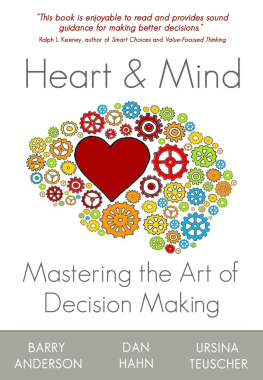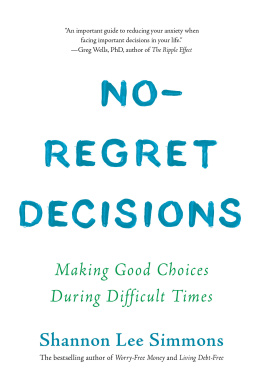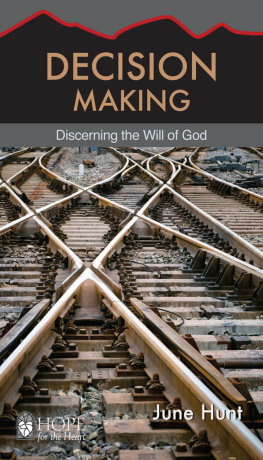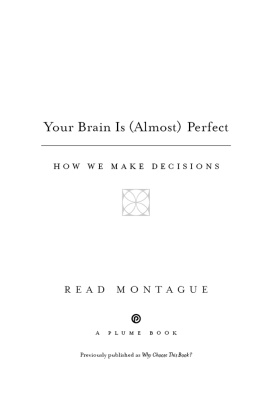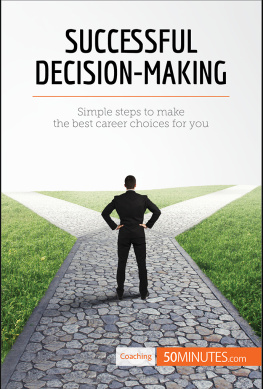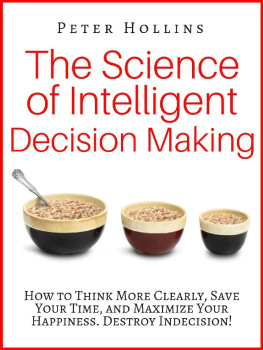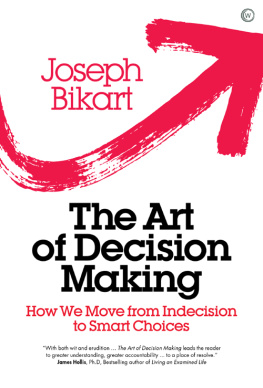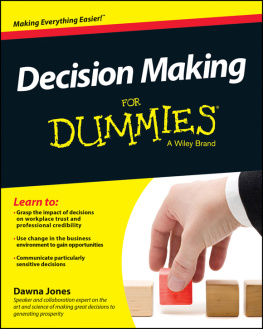Heart and Mind
Mastering the Art of
Decision Making
Barry Anderson
Dan Hahn
Ursina Teuscher
Copyright 2013 Barry Anderson, Dan Hahn, and Ursina Teuscher.
This book is adapted from Barry Anderson (2002). The Three Secrets of Wise Decision-Making. Single Reef Press.
All rights reserved.
ISBN 10: 1490317627
ISBN 13: 9781490317625
About the Authors
Together, Barry Anderson, Dan Hahn, and Ursina Teuscher have guided thousands of clients and students through difficult personal and work choices. This book is a synthesis of their experience and scholarly research on making big decisions. They also provide personalized decision coaching and tailored workshops and can be booked for speaking engagements worldwide. For more information and other resources (including a free initial personal decision-making consultation), visit www.masteringdecisions.com.
Barry Anderson
Barry Anderson received his Ph.D. in Experimental Psychology from The Johns Hopkins University in 1963 and his B.A. in Psychology from Stanford in 1957.
Barry has crafted much of his coursework to help students make better decisions and achieve more satisfying resolutions to conflicts. His current interests are applications of decision psychology and decision analysis to personal and public policy decision making. Barry has been teaching at Portland State University since 1968 and has written three complimentary books of intellectual tools with examples from multiple professions.
The Psychology Experiment showed how the same principles that have proved so useful to the scientist in testing scientific hypotheses also provide the best framework to guide the intuitive thinkers efforts to sort truth from fiction in daily life. The Complete Thinker added scientific principles for inductive reasoning, logical principles for deductive reasoning, techniques for improving memory, creative thinking, and rudimentary decision making. The Three Secrets of Wise Decision Making brought everything together by recognizing decision making as the focal activity in which various cognitive processes come together to improve choices and point the way to a better life. While that last book was never published, he instructed hundreds of students using it and it is the basis for Heart and Mind.
Barry has also developed The Wise Decider (www.wisedecider.net), a free guide to help people make simple and complex decisions with a very user-friendly decision table.
Dan Hahn
Dan Hahn received his M.S. in Industrial/Organizational Psychology in 2008 from Portland State University and a B.S. in Financial Management from the University of Illinois - Urbana Champaign in 2001.
Dan is a human resource management consultant, entrepreneur and adjunct professor of psychology at Portland State University. He has taught decision-making and leadership classes at PSU since 2010. Dan studies factors affecting the productivity, health, and motivation of people at work and develops unique systems to match employee and candidate strengths to career opportunities. He also helps clients gain more insight into their strengths and develops strategies to align their personal values with long-term goals.
After years of peer ridicule for his difficulty making choices on everything from crippling restaurant menus to serious relationship challenges, Dan decided to apply his strong basis in statistics and research to practice, teach and communicate with others a better way. Hes also champion for solar energy across the country, proud new father and hopeless Chicago Cubs fan.
Ursina Teuscher
Ursina Teuscher received her PhD in psychology in 2004 and a professional degree (MS) as a career counselor in 2000 from the University of Freiburg, Switzerland.
As a decision coach and consultant, she helps people and organizations think more creatively and systematically about their decisions and achieve their goals.
Ursinas published research and teaching over the years has focused on cognitive psychology, neuroscience, learning, memory, decision making, and coaching techniques.
Her consulting and educational projects include strategic planning for small businesses and non-profits, and post-graduate training courses in decision techniques for career counselors. She currently teaches popular decision making classes at Portland State University (PSU) and at the Small Business Development Center at Portland Community College (CLIMB PCC).
Find out more about her at www.teuscher-counseling.com
Contents
Introduction
Im so overwhelmed with all the choices I have that I dont even know where to start.
The decision Im facing is so important and could have such grave consequences that I feel completely paralyzed. Im full of anxiety and dont know who to talk to.
I feel like Im stuck in a rut. I dont even think I have any choices, Im just moving along without a purpose or passion. I would like to get out of this, but dont know how.
Sound familiar? Chances are your teachers, parents or mentors have never given you any specific instructions as to how to make a good decision. Most people are surprised to hear theres an entire research discipline and an astonishing amount of expert agreement on how we can make better choices.
Who Is This Book For?
You! Are you struggling with making a specific life choice? Even if you arent, chances are you will at some point, and you may know others who are. This book is for people making decisions, and those with friends, spouses, or strangers who have something on their plate to consider. We also think professionals who are guiding others through decisions will find it helpful, such as counselors, attorneys, doctors, teachers, coaches, or parents.
Scholars have been studying how to optimize decision-making processes for decades. The problem is this great body of knowledge on how to make good decisions has mostly been limited to engineering, business analysis and systems science applications, and usually stays very cerebral, complicated and formal.
On the other hand, we are making so many choices every day that our intuitive decision-making skills are pretty sharp. Given all this practice, its not surprising that we are usually getting by just fine with our intuition alone (Kahneman, 2013; Gladwell, 2009). For the most part, our instincts work so well that we dont even realize how much better we could be doing by using a more structured and creative thought process to make choices.
There are big gaps between what decision experts know and what the rest of us know and do about our own big decisions:
- There are hardly any attempts to translate the useful and established decision making methods into easy to understand language, without losing depth.
- There is lacking effort to apply these methods to problems we face in our personal lives, such as career choices or relationship decisions (rather than to business strategies, public policy decisions, etc). This is the case even though people experience most regret in romance, family, education, and career choices, and not as much in finance and health decisions, which have been the focus of most decision literature (Morrison & Roese, 2011; Roese & Summerville, 2005).
- There is a missing process to link our intuitive decision making skills to a more rational approach in a way thats easy to apply. Intuition, gut feelings, emotions they arent enemies of rational thought. They are a crucial part of any decision which need to be embraced and integrated into a step-by-step framework to make the best use of our talents and potential. The challenge lies in having the courage to use this process to get our hearts and heads speaking the same language. Only then can we expect to reach better outcomes.

